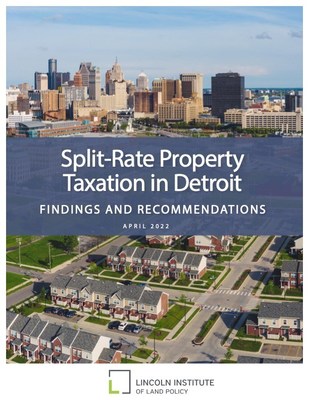[ad_1]
CAMBRIDGE, Mass., April 4, 2022 /PRNewswire/ — Reforming Detroit’s property tax system by taxing land at a better charge than structures would assistance to revive the neighborhood overall economy and cut down tax bills for approximately every single home owner, in accordance to a new examine from the nonprofit Lincoln Institute of Land Policy.
With the cheapest assets values of any significant U.S. city and some of the greatest property tax charges, Detroit is caught in a a long time-long cycle of rising tax charges that continue to fall short to generate enough earnings. In the absence of potent general public expert services, higher home taxes maximize proprietor expenditures, decrease residence values, and increase the charges of fix and redevelopment, generating a drag on financial recovery.
Like numerous economically distressed cities, the town copes with this problem by supplying generous tax abatements for new progress and for some house owners. Abatements relieve excessive fees and briefly increase residence values, but they can only be given to a modest established of people and new companies. This leaves high—sometimes destabilizing—tax payments in spot for lengthy-expression entrepreneurs. Even though significant taxes continue to be on most houses and companies, inclusive and long lasting incentives for reinvestment are absent.
A increased tax fee for land than for structures—known as “break up-rate” because there are two various tax rates—would address the dilemma extra efficiently and distribute the added benefits more equitably.
The new examine, Break up-Charge Property Taxation in Detroit: Conclusions and Tips, finds that taxing land at 5 situations the charge for buildings would result in reduce tax payments for 96 p.c of house owners, with an common price savings of about 18 p.c. Beneath a earnings neutral reform, tax price savings would be completely offset by tax increases on vacant and underutilized home.
“By adopting a break up-price home tax, Detroit can make its tax procedure both equally a lot more economical and more equitable,” claimed John Anderson, an economist at the College of Nebraska, Lincoln, and lead writer of the study. “Effectiveness is enhanced by getting rid of the tax-relevant limitations to funds advancements and growth. Fairness is improved by a reduction in taxes for the wide majority of household homeowners.”
“Splitting the residence tax delivers long-time Detroiters with the tax relief that new organizations and people currently acquire,” claimed co-writer Nick Allen, former supervisor of technique and policy for the Detroit Economic Expansion Company and now a doctoral candidate at the Massachusetts Institute of Engineering. “Our study displays that it is an successful, rapid way to forever decrease burdens on overtaxed homes and restore residence wealth. It’s not plenty of, but it is a expected phase in the direction of racially equitable recovery.”
In addition, a break up-fee tax improves the charge of keeping vacant land and reduces the expense of building it, or of renovating deteriorated buildings. Lowered tax burdens and accelerated investment decision direct to an ordinary increase of 12 % in the benefit of residential residence and an increase of 20 % for professional house. In a supporting complex paper, the challenge staff also discovered that the proposed 18 % reduction in household taxes would reduce residential tax foreclosures by at the very least 9 p.c.
“Implementation of a break up-level tax in Detroit features an opportunity to strengthen the house tax system by escalating efficiency, and reducing home tax inequities and tax foreclosure,” explained Michigan Point out College economist Mark Skidmore, a co-writer of the analyze.
Commissioned by Make investments Detroit with help from The Kresge Basis, the research analyzes details from municipalities in Pennsylvania that have executed spit-amount taxes, as nicely as real estate and property tax information from Detroit. In addition to Anderson, Allen, and Skidmore, the study’s co-authors contain Fernanda Alfaro of Michigan Condition College, Andrew Hanson of the College of Illinois at Chicago, Zackary Hawley of Texas Christian University, Dusan Paredes of Northern Catholic University in Chile, and Zhou Yang of Robert Morris College.
“If we are to keep on the momentum of Detroit’s favourable, equitable development, we will have to remodel our residence tax framework to alleviate the load on bulk Black home owners and neighborhood developers,” mentioned Dave Blaszkiewicz, president and CEO of Make investments Detroit. “This report presents a solution that accomplishes that although also disincentivizing blighted and underutilized qualities that hinder Detroit’s expansion.”
“With this assessment, Devote Detroit has elevated an equitable technique to taxation that can carry considerably-essential relief to tax-burdened Detroiters though encouraging financial investment and progress. This is a well timed notion that addresses an urgent worry, and the extremely regarded Lincoln Institute of Land Coverage has now presented a reliable framework for community discussions,” explained Wendy Lewis Jackson, managing director of Kresge’s Detroit System.
The crew also developed a few technological papers to assist the review: “Assessment of Residence Tax Reductions on Tax Delinquency, Tax Foreclosure, and Dwelling Possession,” “Break up-Charge Taxation and Business enterprise Institution Site Evidence from the Pennsylvania Knowledge,” and “Break up-Fee Taxation: Impacts on Tax Base,” all released by the Lincoln Institute.
The research is out there for obtain on the Lincoln Institute’s site: https://www.lincolninst.edu/publications/other/break up-fee-house-taxation-in-detroit
The Lincoln Institute of Land Policy seeks to strengthen excellent of lifetime as a result of the efficient use, taxation, and stewardship of land. A nonprofit private running foundation whose origins date to 1946, the Lincoln Institute researches and suggests innovative techniques to land as a option to economic, social, and environmental difficulties. As a result of education, schooling, publications, and functions, we combine theory and exercise to notify community plan selections all over the world.
![]() Check out first information to obtain multimedia:https://www.prnewswire.com/information-releases/new-report-taxing-land-much more-than-properties-would-help-detroit-house owners-and-spur-development-301516877.html
Check out first information to obtain multimedia:https://www.prnewswire.com/information-releases/new-report-taxing-land-much more-than-properties-would-help-detroit-house owners-and-spur-development-301516877.html
Source Lincoln Institute of Land Plan

[ad_2]
Source backlink






More Stories
Factors To Consider In Buying A Lawn Mower
Car Buying Tips: Why Does It Make Sense to Buy a Discontinued Car Model?
Sealants For Industrial And Domestic Use – Their Characteristics And Uses